Jaro 2018
Asma Abbas: "Unwilling Ends: Provocations to Politics and Method in an Age of Austerity, Terror, and Fascism."
Dear colleagues,
I am glad to inform about and invite you to the first Department research meeting that will be held on February 28th from 13.30 in U34. The presenter is our Fulbright fellow, Asma Abbas, the title of her presentation is
Unwilling Ends: Provocations to Politics and Method in an Age of Austerity, Terror, and Fascism.
(abstract below)
Abstract:
What, if any, is the imperative of ongoing histories of injustice and oppression for our
methods in the humanities and social sciences? Who is our work as teachers, scholars, and
students, accountable to, if we suppose, for a moment, that frameworks of utility,
salvation, and philanthropy are not the only, or even the most compelling, ones available
for appraisals of our purpose and practice? Are there other ways of approaching the
politics of our method beyond the content of what and who we study and teach? The
presentation’s questions draw on visions and practices of scholarship and pedagogy and
their mutuality rooted in decolonial, historical, feminist, postcolonial, and materialist
understandings of our shared global conditions. As a historian of form and method to
recall the "forms of life" to which philosophers have drawn attention to, I hope to
introduce some questions that orient my work as a political theorist and educator, that
can lead to an open discussion about how histories our impact our methods of inquiry and
our self-conceptions as thinkers and teachers, and what we each might bring to an agenda
for the social sciences and the humanities in this historical moment.
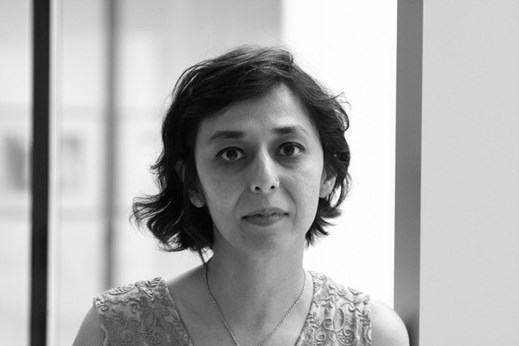
Podzim 2017
Runya Qiaoan: presentation of dissertation
David Talks to Goliath: non-governmental organizations’ policy advocacy in China.
December 13, 2017 at 1.30 pm in U34
Abstract: The general assumption of civil society in China is that it is insignificant or almost non-existent. However, the recent development of the Chinese civil society might challenge this conventional view. In the past decade, Chinese non-governmental organizations (NGOs) have achieved significant success in their policy advocacy attempt, including policy and law changes on the national level. Why can small civil society organizations have such a big policy impact in an authoritarian state? In this research, I draw insights from the cultural pragmatic theory of social performance and social movement theory on framing to advance our knowledge of NGOs’ communicative power in China. I argue that behind a successful policy advocacy is the mechanism of cultural resonance. Chinese NGOs’ skillful transplant of the symbolic codes that Chinese government identifies with into their performance leads to the cultural resonance, which contributes to their success. While former studies on Chinese civil society tend to explain the success or failure of NGOs’ interaction with the state through an institutional perspective, this research investigates how culture and meaning function in this interaction. Besides, this study expands the social performance framework by emphasizing the role of the audience, and it adds to the framing theories by highlighting the constraints of cultural background.

Markéta Pechholdová: Rodinný stav a vzdělání jako determinanty zdraví: analýza propojených záznamů ze sčítání 2011 v ČR
doktorka Markéta Pechholdová z katedry demografie Vysokej školy ekonomickej v Prahe
Rodinný stav a vzdělání jako determinanty zdraví: analýza propojených záznamů ze sčítání 2011 v ČR.
Rodinný stav i vzdělání jsou dlouhodobě považovány za významné determinanty zdraví měřitelné v celopopulačním rozsahu z rutinních statistik. Předchozí studie prokázaly rozdíl až deset let v délce života mezi nesezdanými a sezdanými a až 18 let mezi osobami se základním vzděláním a vysokoškoláky. Tato diferenciace však zatím nebyla prozkoumána za současného přihlédnutí k oběma těmto faktorům. Vzdělání je navíc jakožto nepovinný údaj v současné běžné evidenci značně nekompletní (údaj o vzdělání zemřelých chybí až u 70 procent případů) a spolehlivost tohoto údaje je v případě zemřelých diskutabilní.
Prezentovaná analýza řeší problém chybějící informace o vzdělání propojením záznamů (tzv. record linkage) z běžné evidence a ze sčítání lidu, kde informaci o vzdělání poskytují sami respondenti během censu. Pomocí metody úmrtnostních tabulek navrhujeme nové odhady naděje dožití dle výše uvedených faktorů a metodou vícenásobné Poissonovy regrese kvantifikujeme a diskutujeme jejich samostatný i společný vliv na výslednou úmrtnost. Tato analýza umožňuje identifikovat nejvíce znevýhodněné populační skupiny a poukázat na celkovou velikost jejich nevýhody.

Michal Tkaczyk: "Mediální pokrytí tzv. migrační krize v českém zpravodajství optikou teorie sekuritizace”
Prezentace disertační práce.
Titul: Mediální pokrytí tzv. migrační krize v českém zpravodajství optikou teorie sekuritizace
Abstrakt: Disertační práce zkoumá sekuritizaci nepovolené migrace do zemí EU ve vybraných českých zpravodajských médiích v době tzv. evropské migrační krize. Na konkrétní proces konstrukce bezpečnostního problému nahlížím jako na případ, jehož studie mi umožňuje lépe porozumět roli zpravodajských médií v procesu sekuritizace. Navzdory rostoucí roli bezpečnostních hrozeb v politické komunikaci a jejich rozmanitému obsahu, je tomuto problému věnováno jen málo studií.
Cílem této disertační práce je na základě pozorování a interpretace mediálních obsahů lépe porozumět roli zpravodajských médií v procesu konstrukce hrozby pro potřeby legitimizace mimořádných politických řešení. Na roli zpravodajských médií v procesu sekuritizace budu nahlížet z hlediska vstupů, které do toho procesu přinášejí. Ve vztahu k takto formulovanému problému si kladu následující hlavní výzkumné otázky: V jakém rozsahu a jakým způsobem mediální pokrytí evropské migrační krize tematizovalo nepravidelnou migraci jako zdroj ohrožení a rizik? Které redakční a obsahové postupy konstruovaly dění coby bezpečnostní problém? Jakým způsobem mediální reprezentace evropské migrační krize v českém zpravodajství (de)legitimizovala jednání aktérů sekuritizace?
Výzkumný design disertační práce lze označit za případovou studii, která sestává ze čtyř dílčích výzkumů, které mapují mediální reprezentaci tzv. migrační krize v online zpravodajských portálech (ČT24.cz, Novinky.cz, iDnes.cz) a tištěných denících (Právo, MF Dnes) během přibližně půlročního období nejintenzivnějšího pokrytí (červen – říjen 2015). Za účelem poskytnout různé typy evidence rozhodl jsem se použít k analýze mediálních obsahů smíšené metody výzkumu: kvantitativní obsahovou analýzu, kritickou diskurzivní analýzu a sémiotickou analýzu vizuálních materiálů.
Dílčí výsledky, týkající se pokrytí tzv. krize třemi online zpravodajskými portály, ukazují, že všechny tři portály pouze s nepatrnými rozdíly upřednostnily vlastnosti jako je naléhavost, výjimečnost, přetížení a nejistota, a přisuzovaly je neurčité vlně migrantů směřujících do Evropy. Konstrukce ohrožení byla posílena zdůrazňováním velkého množství migrujících osob a jejich nejasnou totožností.
Zpravodajské portály nejčastěji definovaly krizi jako administrativně-logistický problém. Na všech třech portálech byly v přibližně třetině článků výrazně zastoupeny rámce, které definovaly události jako hrozbu, bezpečnostní riziko nebo jako trestnou činnost. Mezi prezentovanými řešeními jsou nejčastější ta, která lze označit za defenzivní a která spočívají v zapojení různého typu bezpečnostních složek (policie, cizinecké policie, armády a dalších), přičemž objektem jejich činnosti byli převážně migranti.
Mezi dalšími redakčními postupy, které přispívaly ke konstrukci bezpečnostního problému v případě tzv. migrační krize, lze zmínit výraznou informační závislost na institucionálních zdrojích, především z vládního prostředí a zejména silových resortů. Závěry studie zaměřené na legitimizaci bezpečnostních opatření („nasazení armády“) potvrdily, že vládní politici, kteří v případě tzv. migrační krize plnili roli sekuritizačních aktérů, měli privilegovaný přístup ke zprávám. Jejich výroky nebyly doplněny o jiné pohledy a perspektivy a nebyly novináři nijak problematizovány. Legitimizační strategie politických aktérů byly převzaty tvůrci mediálních obsahů, co bylo patrné například v lexikálních volbách a společně sdílených předpokladech o povaze událostí.
Avšak představa pasivní role zpravodajských médií v procesu sekuritizace, kterou lze vyvozovat z těchto zjištění není úplná. Dílčí výsledky naznačují, že podoba sekuritizačních aktů, jejímž prostřednictvím se političtí aktéři snaží vnutit svoje principy vidění a dělení, je strukturovaná objektivními strukturami žurnalistického pole a praktickým smyslem aktérů, kteří se v něm angažují. Strategie pokrytí dění kolem krize odpovídají tendencím, které ve vztahu k médiím pojmenoval Pierre Bourdieu (1998): dramatizace, depolitizace, cirkulární cirkulace, preference urychlených soudů, banalizace či tendence prezentovat dějiny jako sled pohrom, které nemůžeme nijak ovlivnit. V tomto smyslu aktivní roli médií v procesu sekuritizace lze chápat jako určitý způsob zpracování a interpretace jednání aktérů sekuritizace, který je vlastní žurnalistickému poli. Dílčí výsledky naznačují také, že zpravodajské obsahy svou strukturou a konkrétními edičními a redakčními postupy poskytují konstrukcím bezpečnostních problémů jejich interní a externí validitu.
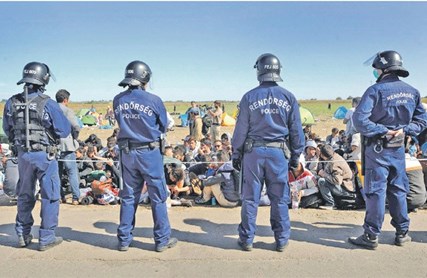
Diskuse nad knihou “Ale snad i pro toto jsme žili, ne?”
Milé kolegyne, drahí kolegovia, vážení študenti,
prijmite pozvanie na besedu o knihe “Ale snad i pro toto jsme žili, ne?”, v ktorej
SLON koncom minulého roka vydal súbornú korešpondenciu sociológov Aleny Miltovej,
Zory Bútorovej, Milana Petruska a Martina Bútoru z posledných rokov komunistického
Československa.
Diskusiu o sociológii za hrdzavejúcou železnou oponou, o priateľstve intelektuálov
vytisnutých na okraj a o tom, prečo a ako čítať ich listy staré tri desaťročia s
manželmi Bútorovcami, Alenou Miltovou a ďalšími brnenskými pamätníkmi povedie
Radim Marada.
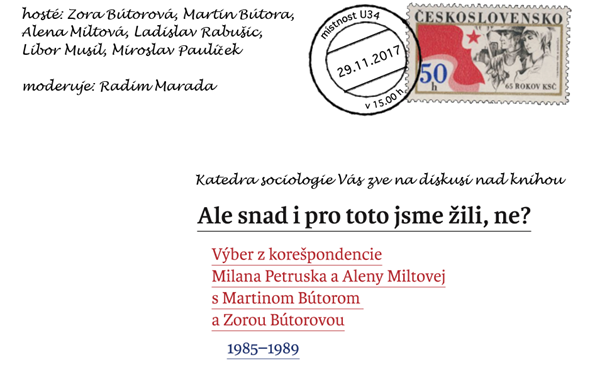
Lenka Kissová: "Individualised welfare and abnormality. The rule of the risk-security-deservingness nexus in the material need policy.”
seminar of the Center for the Cultural Sociology of Migration
Lenka Kissová’s working paper entitled "Individualised welfare and abnormality. The rule of the risk-security-deservingness nexus in the material need policy.”
Abstract
In 2014 new conditions within the Act on assistance in material need came into force in Slovakia. This legal act was proposed by the Ministry of Labour, Social Affairs and Family and it conditions the basic part of the provision in material need with workfare. Thus, Slovakia has become one of the countries where welfare cut-backs affect the basic benefit in material need as well. As the main argumentation includes motifs of ‘motivation’, ‘adjustment’, ‘self-responsibility’ and ‘deservingness’ of beneficiaries, the individualisation rationality seems to take a lead.
The goal of the paper is to examine the perspective of the policy-makers, articulation of their ideas, motivations, opinions and arguments legitimising the recently adopted Act. The analysis is based mainly on the document analysis and critical political discourse analysis of parliamentary debates. In the paper I argue that the ‘deservingness’ phenomenon further co-occurs with the security and risk-prevention arguments. Based on the critical analysis of the debates, I argue that the formation of a risky other legitimates the adoption of measures which restrict social benefits and exclude people in need from solidarity. For all this, I argue that the welfare is one of the tools used by political actors to control and regulate behaviour of individuals. Moreover, in case of Slovakia, control and regulation of behaviour through risk and security assume an ethnic dimension.
Key words: political discourse, deservingness, risk, material need, Roma

Péče na prodej. Jak se práce z lásky stává placenou službou.
Adéla Souralová, Tereza Hronová, Matouš Jelínek, Vendula Křivá, Stanislav Makeš, Monika Španielová
Co mají společného miniškolky, hotely pro psy, hodinoví manželé, agentury poskytující péči o seniory, děti či domácnost? Jedná se o subjekty prodávající služby ještě donedávna vykonávané z lásky – rozuměj bezplatně – samotnými členkami a členy domácnosti. Kniha Péče na prodej se věnuje současnému trendu přesouvání úkonů tzv. sociální reprodukce ze soukromé sféry rodin a domácností do veřejného prostředí trhu. Autoři předkládají zjištění kvalitativního výzkumu, který se zaměřil na vytváření nabídky těchto služeb a jejich prezentaci klientům a klientkám. Perspektiva poskytovatelů, tedy majitelek a majitelů uvedených agentur, je velmi zajímavá. Nabízí vhled do myšlení a praktik lidí, kteří aktivně řídí vlak marketizace našich životů.
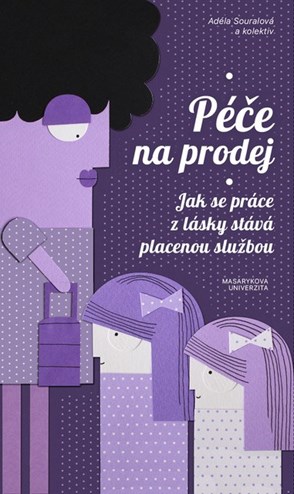
Lada Železná: prezentace disertační práce


Kateřina Sidiropulu Janků: "Contested Borderscapes. Voting by feet, hands and tongues in the island of Λέσβος”
Dear all,
The conference “Contested Borderscapes. Transnational Geographies vis-à-vis Fortress Europe” took place in University of the Aegean, Mitilini, capital city of the Greek island Lesbos, this autumn. The aim was to bring together scholars, activists and artists to debate about contemporary conditions of everyday borderscapes in Europe after the asylum system shake in 2015-2016; bringing transdisciplinary perspectives and to a certain extent making a political statement.
I got the opportunity to come to Lesbos and make experimental on-site discoursive intervention “Fixing ruptures in the neighborhood”. I will share with you what happened within the three days of my fieldwork and what I suggested as an intervention at the end of it.
Besides that, I would like to reflect on the conference event itself, fot that purpose I chose the reading of essay by two political scientists, Lorenzo Rinelli and Sam Okoth Opondo.
I am now working on a text based on my work in Mitilini, if you are interested to look up the draft before the CCM meeting, please, let me know. katerinasj@fss.muni.cz
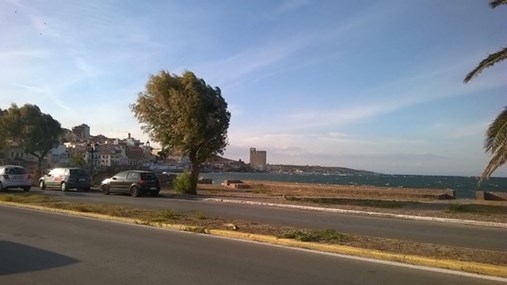
Petr Mezihorák: Hands, Hearts, or Heads? Shared Services Centre and Commodification of Work in Multinational Corporation
Abstract
In Polanyi’s view, the labour becomes commodity in the moment it is bought and sold in the labour market. This is not going far enough. To understand the commodification of work we need to go into a firm. In the case of multinational corporation, the transformation of work into a commodity happens on its way between units. Therefore, it is necessary to study relationships among different workplaces and people, usually across borders, within the corporation, to understand how the work is really transformed into a commodity. A shared services centre (SSC) centrally provides those services in an organisation which had been previously administered in more than one of organisation’s departments. These departments represent internal clients of internal supplier embodied by a SSC. My research question is: How does the relocation of activities to a shared services centre change work and organising of activities within a multinational corporation? I conducted two comparative case studies. Both studies concern multinational banks domiciled in Western Europe which recently built their SSCs in Central Europe. The data collection involved conducting thirty-three semi-structured interviews. The relocation was in both cases motivated by lower labour costs in Central Europe. This answer, however, offers only very shallow vision of the process. The relocation of activities from one place to another, across the state and language borders, required a cooperation of many actors with radically different interests but also power potentials. This explains why it was accompanied by the proliferation of new control mechanisms and the change in the way of working and organising of activities within the corporation. The SSC established as a support unit aimed to strengthen its position in the organisational structure by gaining control over labour processes and their modification. Competition with client departments for control over labour processes led to the introduction of controlling mechanisms, norms and standards both in the SSC and in client departments. These rules, on the one hand, limited uncertainty; on the other hand, they drove the fragmentation of labour processes, rendering them more codifiable and less complex. These effects made labour processes easier to control and, eventually, to relocate, which was advantageous for the headquarters. The fragile position of the SSC on the boundary between being inside and outside a corporation thus drove the relocation. This was related to the increase in the control and division of labour, and intensity of work within the whole corporation.

Johana Kotišová: Freezing. An avant-garde ethnography of crisis reporters
The dissertation explores technological co-shaping of journalists’ emotional experience in crisis situations. Journalists’ work-related emotions lie at the core of the paradox of the traditional journalistic commitment to objectivity – understood as detachment, neutrality and impartiality – and the moral commitment to action face to face other people’s suffering, and thus are vital for understanding crisis reporting practices and outcomes. Grounding the research in three sensitizing concepts – ‘crisis’, ‘emotion’, and ‘technology’ – I address the following questions: What does ‘crisis’ in ‘crisis reporting’ mean? What is crisis reporters’ emotional experience? How does technology articulate journalists’ emotional experience of crisis?
The research design is opportunistic, based on multi-sited ethnographic fieldwork – mainly five-month participant observation in three different newsrooms of Czech media and thirty-three in-depth interviews with Czech and Belgian ‘crisis reporters’, i.e., journalists reporting on terrorist attacks, wars, natural disasters and other crisis events.
The analysis shows that direct or vicarious on-site presence in crisis brings about feelings of sadness, indignation, pity, anger, fear, stress, tension, compassion, horror, and tiredness; the emotions need to be suppressed or postponed, though. Repetitive reporting on emotionally disturbing events and witnessing close or distant suffering may result in specific emotional styles, among which cynicism holds a prominent position. The journalists’ emotions are constitutively entangled with intrinsic features of their profession: crisis contexts and the newsmaking machine, i.e., the complex of technologies of production, technologies of sign systems, technologies of power and technologies of the self. At the same time, they challenge the notion of a professional journalist as an observer rather than an actor, and of traditionally understood objectivity as a cornerstone of journalistic professionalism.
Based on how the journalists make sense of their emotional development, the dissertation also reconsiders the meaning of ‘crisis’, ‘emotion’, and ‘technology’ in the specific context of crisis reporting. The redefinition of crisis as spreading of cynical ideology, emotion as not individual and intimate but individualizing social problems, and technology as situating all forms of life within a domain of technical manipulation, then prepares the ground for a critical reappraisal of journalists’ professional ideology and a critique of institutional, particularly media (in)action. I suggest that accepting and encouraging journalists’ overt (emotional) engagement and following objectivity as an ethical practice rather than an objectivistic norm would help to reduce journalists’ emotive dissonance and to confront the cynicism pervading media organizations, media practices, and their outcomes.
The dissertation is written as a creative nonfiction, combining factual and fictional narrative. Such a form of writing has five functions termed contentual, metaphoric, organizing, effective and self-reflexive.

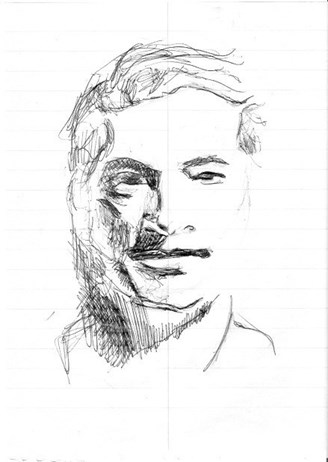
Adam Gajdoš: “Built on Dead Bones. Ethnic Cleansing, Cultural Trauma, and Post-Socialist Solidarity-building in a Central-European Town”
This dissertation explores the local approaches to the commemoration of the cultural trauma of ethnic cleansing in the city of Košice, Slovakia. Situated on an ethno-linguistic border, between 1938 and 1948, more than a half of Košice population was subject to a series of politics of ethnic persecution, forced migration and genocide, adopted and performed by different states and regimes in preparation for, in the course of or in response to the Second World War. Departing from the assumption that the pluralization of mnemonic discourses after 1989 opened venues for cultural trauma process and, at the same time, forced a revision of local cultures of remembering, I analyze different approaches to the task of publicly representing a painful past as a common matter. Based on an diverse corpus of data, mostly composed of interviews, analysis of local press and participant observation, this dissertation reconstructs the landscapes of meaning in which post-socialist practices of remembering ethnic cleansing unfold.
Seeking to better understand how remembrance of cultural trauma can contribute to an inclusive, reparative civil discourse, I analyze how the universal relevance of the Shoah, the post-war persecution of Hungarians in Czechoslovakia and the humanist legacy of anti-communism is accomplished in post-socialist memorial initiatives. The public figurations are contextualized by a critical overview of the different cultures of remembering experiences of ethnic violence as developed and practiced by seven local-patriotic civic associations. Broadening the perspective, I review the history of the ideological re-naming of Kosice street-names and locate points of tension between the early post-socialist attempt at their ideological neutralization and two late post-socialist naming initiatives related to representation of the Hungarian minority. Finally, I analyze how a recent controversy around the plans to build on a ruined cemetery ground converged around a municipal plan to build a Memorial park and discuss it both as a case of heritage management showing the weak bearing of war-induced discontinuity on heritage management, and as a metaphor of the trauma process. In the conclusion, I draw on Laurent Thévenot’s pragmatic notion of grammars of commonality to discuss the role of place-based attachments for an effective communication of cultural trauma and the conditions under which its mnemonic figuration promises extensions of cross-sectional solidarity.
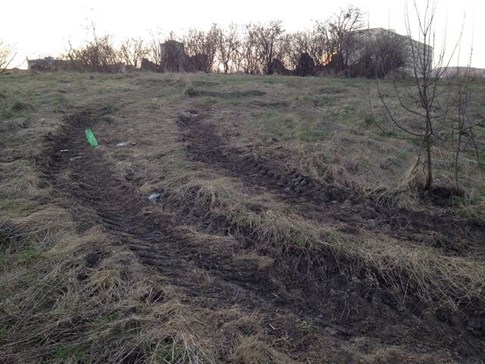
October 4: Lucie Jarkovská and Mallika Pinnawala
The paper analyzes articles on sex education published between 2007 and 2016 at pro-Russian websites in Czech and Slovak languages. Using quantitative content analysis and discourse analysis the study elucidates how the issue of sex education is used as a weapon in the information war. Articles on sex education at pro-Russian websites resemble the culture war – opponents of sex education are trying to discredit liberal sex education in schools. However, the main objective is elsewhere. The extreme and manipulated representation of sex education at pro-Russian websites is part of a Russian propaganda and disinformation campaign. Their aim is to undermine public confidence in national and transnational institutions, such as the EU or UN, to exploit sex education, to divide societies, and to destabilize European countries. They trigger social anxiety by using emotional language, generalizing rare extreme cases and presenting them as symptomatic of the rotten system in liberal democracies, and utilizing regional sensitive issues, in the case of central European countries the feelings of inferiority linked to post-socialist experience and the status of second-rate EU citizens. Russia strives to be perceived as a Savior of traditional values, actively feeding a conservative backlash and anti-gender and anti-LGBT movements. By doing so, it recruits conservative allies across Europe to expand the Russian influential sphere.
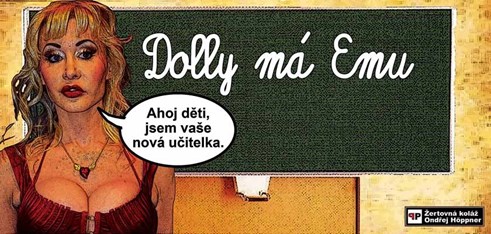
Prof. Mallika Pinnawala is one of the leading sociologists in Sri Lanka today. Gaining her Ph.D. in the Nederlands, she returned to her native Sri Lanka to devote herself tu Urban and Development Studies, as well as to the research of culture and female migration. Today´s lecture introduces to the audience current female transnational Sri Lankan migrant workforce. Unlike in the sixties and seventies of the past century, when women migrated as dependants of their husbands, today they travel independently, in the new gender-based global labour market. These migrant women not only play an important role in the economy by contributing to the national income of the country, but also have acquired a new role in the family by becoming, if not the sole provider, at least the main provider of the family during the time of their migration. This leads to female empowerment, while at the same time it has repercussions on the role of husband in the marrital affairs. Prof. Pinnawala will present her own primal research upon the topic, debating both sides of the migration coin.
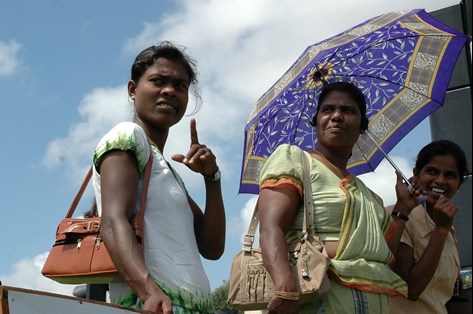
Adéla Souralová and Hana Fialová: Where have all the fathers gone? Remarks on feminist research on transnational fatherhood
First seminar of the Centre for the Cultural Sociology of Migration opened this semester’s edition of Research meetings.
The seminar discussed the recently published article by Adéla Souralová and Hana Fialová entitled “Where have all the fathers gone? Remarks on feminist research on transnational fatherhood”.


Jaro 2017
Hans Siebers: What Turns Migrants into Ethnic Minorities at Work? Factors Erecting Ethnic Boundaries among Dutch Police Officers

Mariusz Baranowski: Education in Times of Uncertainty. Uncertainty in Education. A Critical Approach
In times of rising precariousness of employment, social inclusion as well as political participation, hopes as well as criticism tend to focus on the outcomes of education. Our guest Mariusz Baranowski of Adam Mickiewicz Univeristy in Poznań addressed these issues based on a critical analysis of Polish education system and its transformations in the past decades.
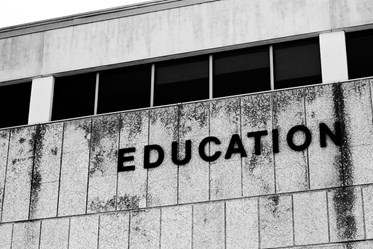
Lenka Kissová: Production of (un)deserving and (un)acceptable: Shifting narratives and representations of migrants within the political discourse in Slovakia
19. 4. 2017 3.15
The following paper examines the political discourse in Slovakia, narratives, explanations and representations of refugees constructed and employed in political argumentation within the discourse. The text reveals main narratives, representations and discursive strategies used in the political framing of refugees, resulting in the non-acceptance of non-Christian refugees. Within the discursive process, boundaries between us and them are constructed. The dividing lines between ‘Slovaks’ and ‘others’ has been formed around the cultural (religious) adaptability, further connected to (un)deservingness. Narratives of (economic and cultural) national interest, protection, sovereignty and crime were the most significant, functioning as background for argumentation, knowledge production, political decision-making and wider identity-building processes. Different narratives were employed before and after the refugee redistribution system adoption. Economic interests, border protection and organised crime were applied in the pre-quota period, whist cultural interest, identity protection and terrorism were stressed in the after-quota period. In both periods, positive us-representation and negative other-representation together with the denial and discursively declared risk based on the element of religion proved to be the main strategies employed for symbolic (and physical) boundaries construction.
Máté Támáska: The structure of space in the two divided towns of the Danube area
19. 4. 2017 1.30
The presentation will focus on the post-socialist townscape of two mid-size twin towns each of which are linked by a bridge over the Danube between Hungary and Slovakia. The sites are: Esztergom-Štrurovo and Komárom-Komarno. The both of our twin towns had erected their bridges in the late 19th century. The bridges linked each historical town to its suburbia (phase of integration) and they became separate entities only after shifting state borders in 1920 (phase of disintegration - the new border line between Hungary and Czechoslovakia, as the historical town on one river bank and the new town in front of it developing separately over long decades. Similar situation of division of urban structures were common in Central Europe History in 20th Century. Thus the notion of divided twin town is part of the urban historical academic discourses in the region. The presentation will show the processes of disintegration and integration and their patterns in the townscapes with help of methodology of architecture sociology. It means that the morphological entities of townscapes will be understood as social facts. Like for example the street lines represent the social networks, paths and activities, the characters of residential areas represent the social status of people, the skyline of townscapes will be interpreted as local identity written in the space. Overlapping historical urban structures and separated new urban spaces make out the general view of divided twin towns. The most significant axe of architectural design is the Danube River, therefore the skyline of historical towns (pictured on historical and actual postcards for example) show the townscape from the opposite riverbank.
Ivana Rapošová: New minorities, activists and multicultural festivals: inclusive commonality in the making?
Dear all,
in the name of the Center for the Cultural Sociology of Migration (CCM), let me invite
you to the second of the CCM’s working sessions, which will take place under the
umbrella of our community Research meetings next Wednesday.
On March 22 at 3.15 pm, the seminar will discuss a draft by the Center’s research
fellow Ivana Rapošová focused around performativities of inclusion in urban
festivals.
Title: New minorities, activists and multicultural festivals: inclusive commonality in
the making?
Abstract: Multicultural festivals are becoming a popular form of contemporary civic
activism. Creating situations of collective effervescence, countering prejudice through
arts and culture, and appealing to emotion rather than to rationality, they represent a
specific and novel means of minority rights advocacy. In this paper, I introduce a case
study of a non-governmental organization aiming to alter the symbolic boundaries drawn
around new minorities living in the city of Bratislava. Building on the ethnography of
one of its regular activities, the urban multicultural festival [fjúžn], I introduce
three specific approaches the civic activists utilize when trying to symbolically
transform public space and make migrants more present in the public discourse.
Specifically, I talk about building bonds and bridges, capturing public spaces, and
encouraging language openness.
If interested in joining in the discussion, please request the draft directly from the
author (ivana.raposova@mail.muni.cz <mailto:ivana.raposova@mail.muni.cz>). Participants
are advised to familiarize themselves with the text beforehand as the meeting will not
include a standard presentation.
Štěpán Mikula: Old sins cast long shadows: Long-term effects of Aussiedlung of ethnic Germans from Czech Republic on migration
Ivana Rapošová: New minorities, activists and multicultural festivals: inclusive commonality in the making?
On March 22 at 3.15 pm, the seminar discussed a draft by the Center’s research
fellow Ivana Rapošová focused around performativities of inclusion in urban
festivals.
Title: New minorities, activists and multicultural festivals: inclusive commonality in
the making?
Abstract: Multicultural festivals are becoming a popular form of contemporary civic
activism. Creating situations of collective effervescence, countering prejudice through
arts and culture, and appealing to emotion rather than to rationality, they represent a
specific and novel means of minority rights advocacy. In this paper, I introduce a case
study of a non-governmental organization aiming to alter the symbolic boundaries drawn
around new minorities living in the city of Bratislava. Building on the ethnography of
one of its regular activities, the urban multicultural festival [fjúžn], I introduce
three specific approaches the civic activists utilize when trying to symbolically
transform public space and make migrants more present in the public discourse.
Specifically, I talk about building bonds and bridges, capturing public spaces, and
encouraging language openness.
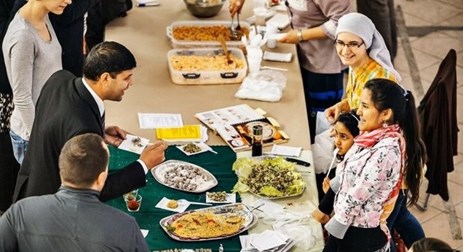
Hana Porkertová: “Nevidomá zkušenost: disabilita jako asambláž a vztah mezi diskurzem, tělem a zkušeností” (only in Czech)
Vážené kolegyne, vážení kolegovia, milí študenti,
najbližšie Bádateľské popoludnie nám ponúka možnosť nahliadnuť do každodennosti nevidomých. V stredu 8. Marca 2017 o 13.30 v miestnosti U34 totiž Hana Porkertová predstaví svoju dizertačnú prácu s názvom
“Nevidomá zkušenost: disabilita jako asambláž a vztah mezi diskurzem, tělem a zkušeností”.
Rukopis práce si môžete preštudovať po tom, čo si ho stiahnete v ISe
<https://is.muni.cz/auth/el/1423/jaro2017/SOC921/um/?info=1>, alebo vyžiadate od autorky.
———————
Abstrakt
Disertační práce je založená na etnografickém pozorování a rozhovorech s nevidomými a slabozrakými lidmi. Výchozím bodem disertační práce je jejich zkušenost, která se odehrává na několika úrovních – zkušenost s tím vidět špatně či nevidět, zkušenost s konceptem nevidomosti, a s konceptem postižení.
Způsob, jak tyto úrovně propojit, ale zároveň uchovat jejich heterogenitu a jedinečnost, je pojetí disability jako asambláže (Deleuze, Guattari), která propojuje diskurz, tělo a zkušenost, a ukazuje jejich vzájemnou dynamiku. Nejde jen o to, jak se vytváří koncept postižení, ale i jakým způsobem se v konkrétních situacích udržuje, jak do něho participující ve výzkumu vstupují, jak do něho vstupují ostatní lidé, zvířata, znaky, věci i zkušenosti. Jak se s tímto konceptem pracuje, kdo nebo co a jak ho proměňuje, jak získává svou stabilitu a kontury a kdy se naopak jako koncept rozpadá – jak se teritorializuje a deteritorializuje. A to jak na jeho diskurzivní úrovni, tak i na té nediskurzivní; nejde jen o to, jak se o postižení mluví, ale co postižení dělá, co vyvolává. To samé platí pro nevidomost. Co to znamená, když je někdo nevidomý? Jak s tímto konceptem zacházejí mí komunikační partnerky a partneři a jejich okolí? Co do něho všechno vstupuje a co to dělá? A konečně jaká je zkušenost s tím nevidět či vidět špatně? Jak se vztahuje k disabilitě a nevidomosti? Na jaké narážejí nevidomí lidé bariéry či nepochopení, nebo naopak na vstřícnost okolních lidí? Jaké vytvářejí strategie na zvládání činností bez zraku ve světě, který je především vizuální, a jak se vytváří linie oddělující tzv. vizuální a nevizuální svět?
Presentation by Nadya Jaworsky
The first of this semester’s Research meetings took place on Wednesday, February 22, 2017 at 1.30 pm (in U34).
Dear all,
remember the beginning of last semester’s bountiful string of lectures and
presentations under the label Research meetings? It started with Nadya Jaworsky’s
excellent habilitation lecture on the news coverage of refugees in American
press.
As a seque to this event, let me extend to you an invitation of the Center for the
Cultural Sociology of Migration recently founded at our department to take part in a
working seminar over Nadya Jaworsky’s article draft. Dropping the customary
presentation, the seminar will open floor to critical remarks and further thoughts on a
text based on Nadya’s habilitation lecture, titled
“The Politics of Selectivity: A Cultural Sociological Analysis of Newspaper Coverage on
Refugees Entering the U.S. and Canada.”
Please, find the abstract below. If you are interested in joining the seminar, please
request a copy of the draft from the author at jaworsky@fss.muni.cz <mailto:jaworsky@fss.muni.cz>.
Best regards,
Adam Gajdoš
coordinator of Research meetings
—————
The Politics of Selectivity: A Cultural Sociological Analysis of Newspaper Coverage on
Refugees Entering the U.S. and Canada (by Nadya Jaworsky)
The latest so-called “refugee crisis” has been dominating headlines worldwide, with
some of the most vocal debates occurring in places that don’t accept such high numbers
of people seeking refuge. My research centers on newspaper coverage of refugees entering
(or potentially entering) two such countries – the U.S. and Canada. The core of the
cultural sociological analysis entails a deep, interpretive reading of 318 news articles
during the period six weeks prior and six weeks following the Paris attacks on November
13, 2015. In all four newspapers in the sample – The New York Times, The Wall Street
Journal, The Toronto Star and The Globe and Mail – one of the primary themes is the
“politics of selectivity,” or the ways in which refugees and asylum seekers are
portrayed as deserving or undeserving to enter the country. The significance of this
study lies in exploring how U.S. and Canadian news outlets frame an important global
issue for their audiences, from publics to political elites. In these two countries,
which could be doing much more in terms of hosting their “fair share” of refugees,
the agenda-setting role of mass media is more important than ever.
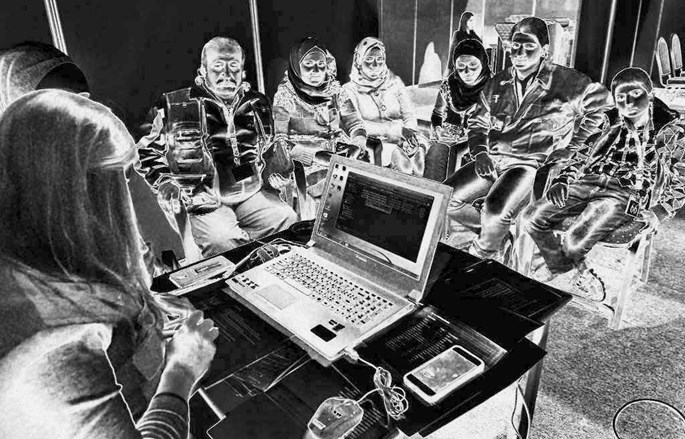
Podzim 2016
Dissertation presentation by Vanda Černohorská
December 7, 2016 at 1.30 pm
“Thank you for leaving all your good advice at the door”: On ASPEKT organization and
online feminism in Czechoslovak context
Introductory note by Vanda Černohorská:
Dear “Research afternoon” participants,
This is an early draft of my dissertation ‘Thank you for leaving all your good
advice at the door’: On ASPEKT and Online Feminism in the Czechoslovak Context.
Roughly speaking, the dissertation presents a case study of the Slovak feminist
organisation ASPEKT, the oldest and one of the most significant advocates of
gender equality in the region. While challenging the theoretical presumption
that new media and digital technologies are detaching us from our historical
and socio-political context and thereby leading to greater homogenisation, it
focuses on the way in which the organisation approaches and makes sense of
these new platforms and tools in relation to their specific history and
political beliefs. It elaborates on topics such as the tension between the
effort to remain creative and independent in times of increasing bureaucratisation of funding opportunities, or making full use of the potential of new online platforms yet staying true to one’s original standards and values. It aims to highlight the following: That even though digital technologies are a global phenomenon which – organisationally and symbolically speaking – transcend time and space, the way we approach digital technologies and new media, the meaning and potential we ascribe to them, is culturally and historically specific.
Thank you very much for taking the time to read my paper and I am looking
forward to your comments and suggestions for improvement. Please keep in mind
that this is a draft and some of the parts need to be further developed.
Open discussion on the meanings, benefits and futures of the “gallery of classics”
December 14, 2016 at 1.30 pm in U34
Coordinated by Adam Gajdoš and Roman Vido
Kateřina Sidiropulu Janků: “Applied sociology – ups, downs and ups”
November 23, 1.30pm, U34
Abstract:
In years 2012-2015 the Department of Sociology was realizing the applied
interdisciplinary project Memory of Roma Workmen. The project was financed by the Czech
Ministry of Culture from the resources of European Commission devoted to the support of
national and cultural identity; the projects from this support are known under the
shortcut NAKI. Besides basic research project promised the production of several applied
outcomes that are recognizable in the system of evaluation RIV. Both basic and applied
research presented unexpected challenges for our interdisciplinary team. Besides several
acknowledgements (including the nomination of the project chief into the first map of
social innovators that was realized by the Ashoka foundation) we also faced several
failures. The failures uncover well the limits of realization of recognizable
social-scientific applied outcomes in contemporary conditions in the CR. First I will
introduce the project outcomes and I will focus more closely on those who survived the
administrative end of the NAKI project and keep on searching its way to their users. We
will then together try to find an answer to the question, what is the difference between
the knee implant and inter-ethnic cooperation. The presentation will be held in English
with the usage of several Roma words and video illustrations in Czech.
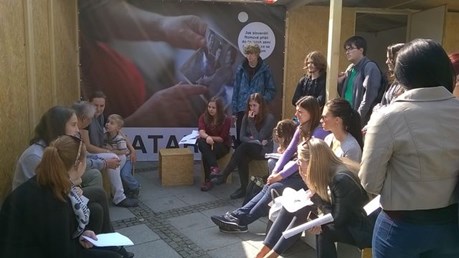
Guest lecture by professor William G. Staples
November 16, 2016 at 3.15 pm
Picking up on the critical discussion of the panoptical qualities of modern life, professor William G. Staples from University of Kansas, spoke about “The U.S Culture of Surveillance and the Securitization of Everyday Life”.
The abstract and photo-teaser below are provided by the speaker himself:
Long before the U.S National Security Agency took center stage, we were deploying ever more sophisticated ways of keeping a close watch on each other. Typically enhanced by the use of new information technologies, these are the quiet, seemingly innocuous techniques—the "Tiny Brothers" as I call them—that appear in the workplace, the school, the community and the home. Often justified in the name of safety and security, these are the strategies used by both public and private organizations and by the people who have authority over us to closely monitor our performance and gather knowledge about
us. It seems after all that there are compelling reasons why we should test employees for drugs, fingerprint welfare recipients, or put surveillance cameras on school buses. We desire to eliminate risk, but at what price? Unless we confront the pervasive and pernicious effects of the securitization of everyday life, we will continue to undermine our individual autonomy, privacy, and human dignity and further deepen our culture of surveillance.

Guest lecture by Neeraj Kumar, a visiting scholar from Tata Institute of Social Sciences
November 9, 3.15pm, U34 - Neeraj Kumar, a visiting scholar from Tata Institute of Social Sciences presently staying at the
Department of Environmental Studies of FSS.
Neeraj is a PhD student analysing policing practices and police reform in India and his
talk “Post-colonial development of police in India: Issues and Challenges” focused
on the historical and theoretical framework of his research interest. While offering a
well informed overview of his research terrain, his project is still a work in progress
and Neeraj invites discussion regarding his empirical take on the subject. For a closer
idea, see his abstract below:
In my lecture, I will first briefly discuss the historical evolution and general
situation of the police in India. Historically, police were used as a colonial instrument
of the British rulers for the suppression of Indian freedom movements and the maintenance of their rule in the country. The advent of Independence changed the political system, but the police system remained more or less unaltered. Then I will point to the main problems in police system in context of police reforms in India. In the post-independence period various Commissions and Committees have been appointed by the Central and State governments regarding police reforms incorporating International human rights instruments, human rights jurisprudence emerged through higher judiciary and human rights institutions so that the Police would be able to perform its legitimate duties and discharge their responsibilities within the 'Rule of Law framework’ and establish its
image as a people's oriented public institution. Despite several reforms initiatives,
enactment of rights based legislations; establishment of human rights institutions,
social movements and presence of 24 hours electronic media had generated unprecedented demand of transparent, accountable and responsible police service. This situation is compelling police establishments and governments to resolve several issues & challenges encountered by the police and situation is not much advanced even after so many years. The presentation would also highlight post-colonial development of police in India andcritically analyze issues and challenges encountered by police to establish as a public institution functioning within the 'rule of law' framework.
(The meditative image, chosen by myself this time, is from an anti-government
demonstration in Ghandinagar earlier this year.)
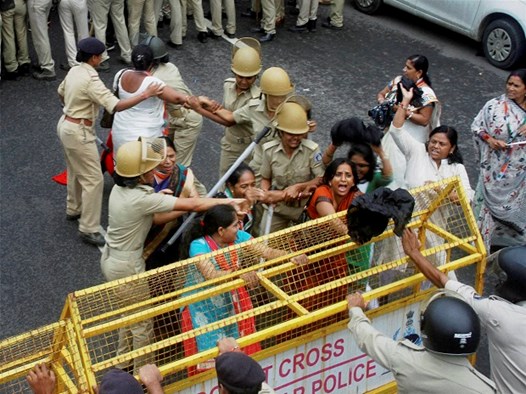
Guest lecture by Hakan Forsell
November 2, 2016 at 3.15pm - Hakan Forsell from Stockholm University delivered a lecture on the “Political Walks in European Urban History: Exploring the Meaning of Heritage, Development and Social Change of Today”
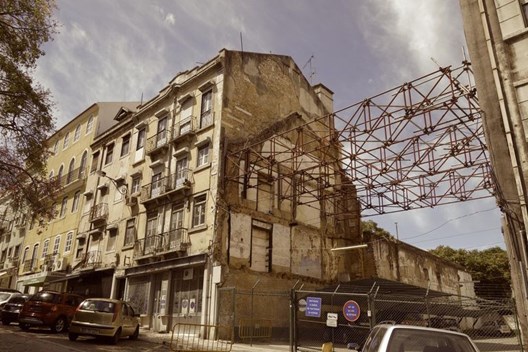
Presentation of Dissertation by Michaela Stejskalová
November 2, 2016 at 12 am
My research examines in sociological perspective one of the most serious human rights
abuses of women – the practice of coercive sterilisation as it was conducted on the
Romani women in the Czech Republic. For the last ten years, this practice had been widely
criticised by various international bodies as a violation of basic human rights, such as
the right to respect for private and family life, the right to make decision on one´s
own body and the right to freely decide on the number and spacing of the children. The
research was conducted as a part of my fellowship for ERRC and it has focused on the
matter of involuntary sterilisations mostly from the perspective of harmed women - how,
when and why did the sterilisations happen and what do they mean for their present days.
In addition to this, the societal and political context had been examined through the
analysis of documents available in the Museum of Romani culture regarding the efforts to
solve the ‘Gypsy population issue’. The whole project had the nature of action
participatory research - the stories of the women involved had been used as a groundwork
for a social theatre some of them have performed in June in Ostrava as a way of
self-advocacy for compensations of involuntary sterilised Romani women.
21 Romani women and 1 non-Romani woman from Ostrava, Most, Louny, Praha and Vsetín had
been interviewed in depth and 2 focus groups were established in order to provide more
equal and open environment for them to share their trauma and various experiences with
doctors and social workers.
This research has been subsequently grounded in a sociological theory through concepts of
social exclusion, gender inequality and ethnicity, as well as power over bodies and
inequalities in health to understand, why was it so easy to sterilise the Romani women at
the end of the communist era and in the beginning of the 90s and why is it now so
difficult for them to receive justice.
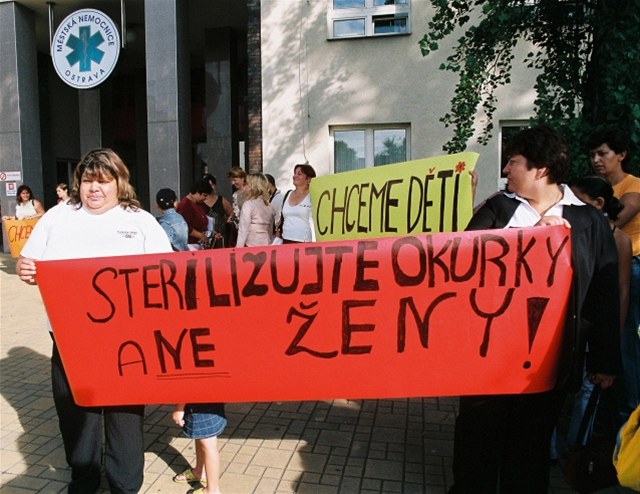
Guest lecture of Örjan Sjöberg (Stockholm School of Economics)
October 19, 2016 at 3.15 pm Guest lecture of Örjan Sjöberg (Stockholm School of
Economics)
Migration and urban growth under different economic systems
Presentation of Dissertation by Jana Obrovská
October 19, 2016 at 1.30 pm Presentation of Dissertation by Jana Obrovská (in
Czech)
Rituály s těmi druhými: Etnografie etnicit a etnizací v desegregované školní
třídě
Presentations of dissertations are not just one of the last formal requirements in our
department’s post-graduate programme, but also an important opportunity for PhD
candidates to receive critical feedback in the final stage of their work. All members of
the community interested in collaborating towards making Jana’s presentation worthwhile
for her are most warmly invited.
To tune in with the topic of Jana’s investigation into the practice of school
inclusion, enjoy a visual teaser from her fieldwork below.
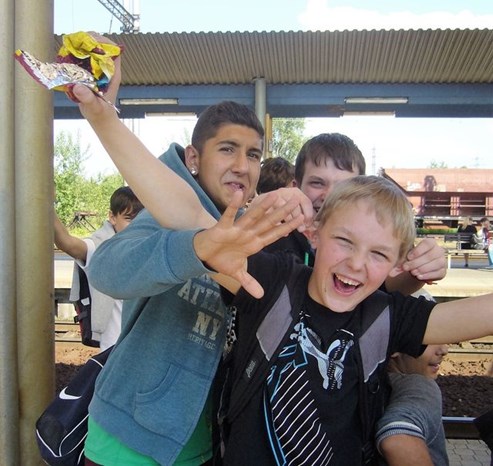
Discussion with Isaac Ariail Reed (University of Virginia, USA)
Discussion focused around Reed’s seminal book “Interpretation and Social Knowledge: On the Use of Theory in the Human Sciences”.
12.10.2016 at 15.00 (room U34)
For photogallery click here.
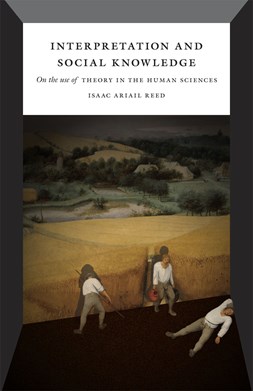
Habilitation lecture of Bernadette Nadya Jaworsky (FSS, MU Brno)
Title: “The Politics of Selectivity: Newspaper Coverage of Refugees Before and After the Paris
Terrorist Attacks"
5.10. 2016 at 13.30 (room U34)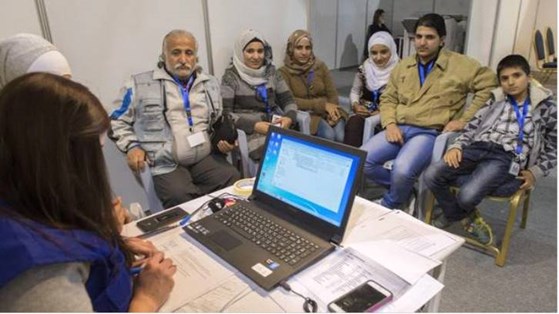
(Foto: Paul Chiasson/The Canadian Press)
Jaro 2016
20/4/2016
Elyakim Kislev, PhD.
(Federman School of Public Policy and Government; The Hebrew University of
Jerusalem, Israel)
„The Israeli identification of Israeli immigrants in the USA“
Info: Michal Vašečka
-------------------------------------------------------------------------
18/5/2016
Meir Yaish
(Department of Sociology and Anthropology, University of Haifa, Izrael)
Info: Martin Kreidl